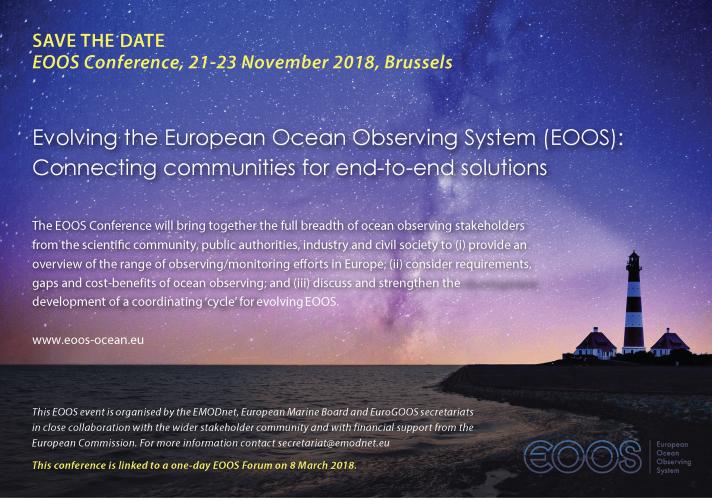- common fisheries policy | sustainable fisheries | fisheries policy
- Wednesday 21 November 2018, 01:00 - Friday 23 November 2018, 01:00 (CET)
Practical information
- When
- Wednesday 21 November 2018, 01:00 - Friday 23 November 2018, 01:00 (CET)
- Languages
- English
Description
EOOS Conference, 21-23 November 2018, Brussels
Evolving the European Ocean Observing System (EOOS)
Connecting communities for end-to-end solutions
Dates: 21-23 November 2018 - from Wednesday morning until Friday Lunch)
Location: Brussels
Venue: The Egg, Bara Street 175, 1070 Brussels, Belgium - www.theeggbrussels.com
EOOS event developed in collaboration with EMB, EuroGOOS and the EOOS Steering Group with inputs from a Conference Advisory Committee and linked to a one-day forum (8 March 2018, Brussels)
Organisational, communication and logistic support provided by the EMODnet Secretariat in collaboration with Secretariats of European Marine Board and EuroGOOS.
Background
Since 2015, the European Marine Board and EuroGOOS have been working in partnership to advance EOOS[1] from a concept to a concrete initiative designed to align, integrate and promote Europe’s complex and fragmented ocean observing capacity, guided by an EOOS Steering Group. Within the scope of this, these organizations identified the need for a gathering of stakeholders in 2018 to advance the EOOS process and gather support from a wide base of stakeholders. It was agreed to combine efforts with the EMODnet Secretariat to organize a joint multi-day EOOS Conference in autumn 2018 gathering support and commitment from the widest possible remit of stakeholders, as a complementary follow up to an EOOS forum to take place on 8 March 2018 focusing on sustainability issues and national operational observing activities. This approach will ensure all drivers, actors and stakeholders converge and join forces to create maximum impact.
Aims and objectives
The Conference will gather the diverse stakeholder communities both delivering to, and dependent on, Europe’s ocean observation/monitoring capacity, to
showcase current and planned ocean observing and monitoring capability by presenting insights from major ongoing activities;
connect and align diverse observing and monitoring communities and those that rely upon their outputs and services;
assess the economic case for sustained observation/monitoring in Europe;
identify gaps and requirements as well as cost effective solutions that will contribute to evolving an efficient, inclusive and effective end-to-end EOOS;
assess the EOOS strategy and implementation and identifying further concrete joint actions to advance the EOOS agenda.
Focus and scope
The scope of the Conference is fully in line with the scope for EOOS itself as envisaged in the EOOS Consultation document: all-encompassing, taking into account the systematic collection of all kinds of data from the marine environment, focusing on the European effort, but set within a global context. The ultimate aim is to ensure a well-coordinated ocean monitoring/observing activity to increase our understanding of the short-medium to long term changes of the system and to underpin an ecosystem based management of our marine and coastal environment which supports blue green growth.
The Conference should address and progress the four main actions underpinning the development of EOOS: (i) Align and connect existing initiatives to ensure efficiency and value for money; (ii) Identify gaps in the European observing capacity and foster initiatives to fill those gaps; (iii) Promote observing capacities which can benefit multiple sectors including research, policy, management and industry; and (iv) Ensure that European ocean observing is integrated into the global observation system(s) by providing a focal point for interaction with international programmes (e.g. GOOS, GEOSS) and partner initiatives outside of Europe.
Main themes
Opening Session: Setting the Scene - EOOS state of play, strategy & early implementation actions
Making the case for sustained observations and monitoring – Cost-benefit assessments and non-economic value use cases involving business, public sector, civil society and research community
Economic value – presenting findings from relevant cost benefit studies
Non-economic evidence - use cases from business, public sector, civil society, research community, wider public
Current and future monitoring and observing activities – Overview of activities and perspectives from key stakeholder communities
Insights and perspectives from the breadth of ongoing/planned monitoring/observation activities at national, regional and Pan-European level
Perspectives from funders and infrastructure operators
Building a fit for purpose EOOS: Gaps and requirements – Results of gap analyses, data stress-tests and requirements studies
Identification of shortcomings and gaps from among others EMODnet stress tests, OSSEs/OSEs and other assessment
Requirements (EOVs/eEOVs, requirement studies in framework of projects and policy frameworks, ...)
Evolving EOOS: Future priorities and next steps – Commitments and actions for joining up European monitoring and observation efforts
How can the above range of efforts be joined up?
How does it fit into the global landscape?
Gather support and commitments for EOOS Strategy and Implementation
EOOS Future priorities and next steps
Closing Statements: Conclusions and Conference Messages
The EOOS Conference will follow on from an EOOS Forum which will take place on 8 March 2018 in Brussels.
See also www.eoos-ocean.eu

